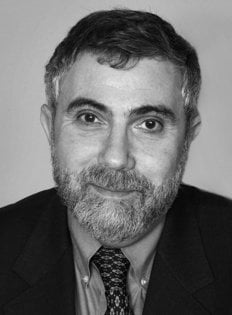Paul Krugman
Biographical

Paul Krugman’s is a lone voice, telling things as they are and debunking Washington policies that are neither compassionate nor conservative.”
– Paul Samuelson
Paul Krugman has at least three jobs: he is professor of economics and international affairs at Princeton University, Centenary Professor at the London School of Economics, and perhaps his best-known job an op-ed columnist for The New York Times. In recognition of his influence, The Washington Monthly called him the most important political columnist in America.”
In addition, Krugman’s reputation extends well beyond the U.S. The Asia Times recently called him the Mick Jagger of political/economic punditry.” The Economist said he is the most celebrated economist of his generation.” And, recently Krugman received what is often called the European Pulitzer Prize, the Asturias Award given by the King of Spain.
Krugman is the author or editor of 20 books and more than 200 professional journal articles, many of them on international trade and finance. In recognition of his work, he received the John Bates Clark Medal from the American Economic Association, an award given every two years to the top economist under the age of 40.
For the past 20 years, Krugman has written extensively for non-economists, including a monthly column, “The Dismal Science,” for the on-line magazine Slate. He has also been a columnist for Fortune and has published articles in The New Republic, Foreign Policy, Newsweek and The New York Times Magazine, before joining The New York Times.
Prior to his appointment at Princeton, Krugman served on the faculty of MIT; his last post was Ford International Professor of Economics. He also taught at Yale and Stanford Universities, and prior to that he was the senior international economist for the President’s Council of Economic Advisers, under Ronald Reagan. (Yes, he served under a conservative President.)
He is a Fellow of the Econometric Society, a Research Associate of the National Bureau of Economic Research and a member of the Group of Thirty. He has served as a consultant to the Federal Reserve Bank of New York, the World Bank, the International Monetary Fund, the United Nations, as well as to a number of countries including Portugal and the Philippines.
His most recent book is The Conscience of a Liberal. His previous work, The Great Unraveling, was highly praised and became a New York Times bestseller in both hardcover and paperback. Professor Krugman and his wife, Robin Wells, have recently collaborated on two college textbooks – Microeconomics published in October 2004, and Macroeconomics published in the September 2005.
This autobiography/biography was written at the time of the award and later published in the book series Les Prix Nobel/ Nobel Lectures/The Nobel Prizes. The information is sometimes updated with an addendum submitted by the Laureate.
Nobel Prizes and laureates
Six prizes were awarded for achievements that have conferred the greatest benefit to humankind. The 12 laureates' work and discoveries range from proteins' structures and machine learning to fighting for a world free of nuclear weapons.
See them all presented here.
